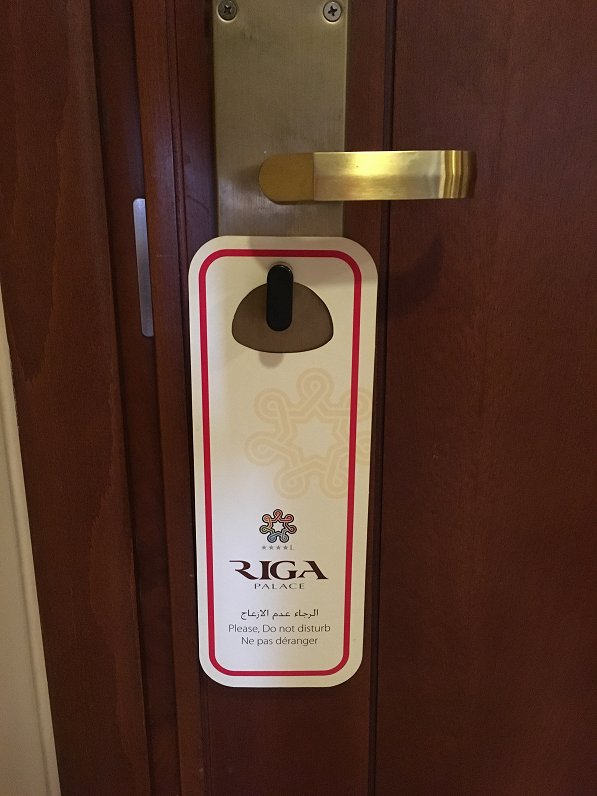Meeting Mr. Riga
The evenings in Aleppo are very dark, but silk-soft and breezy. Me and Nawras are seated on the terrace at the top of Riga Palace, surrounded by tiny tables with waiters circling about inside a large tent protected from the elements by a heavy duty fabric. A wedding was held there a little while ago.
The city is at your feet. If you lean over the sturdy, wide wall, you can hear the buzz of people and cars down below. But something's a bit different here.
Aleppo is much darker than most cities of this scale. That's because many houses have turned into ruins after being bombed, while not all people living in the houses that have weathered the war can afford generators to make electricity during a grid shortage.
The lights go out at the Riga Palace as well, with a boom, several times a day, both in the daytime and in the evening. It's then that the roaring electric generators, placed in a line on the roof of the hotel, take over.
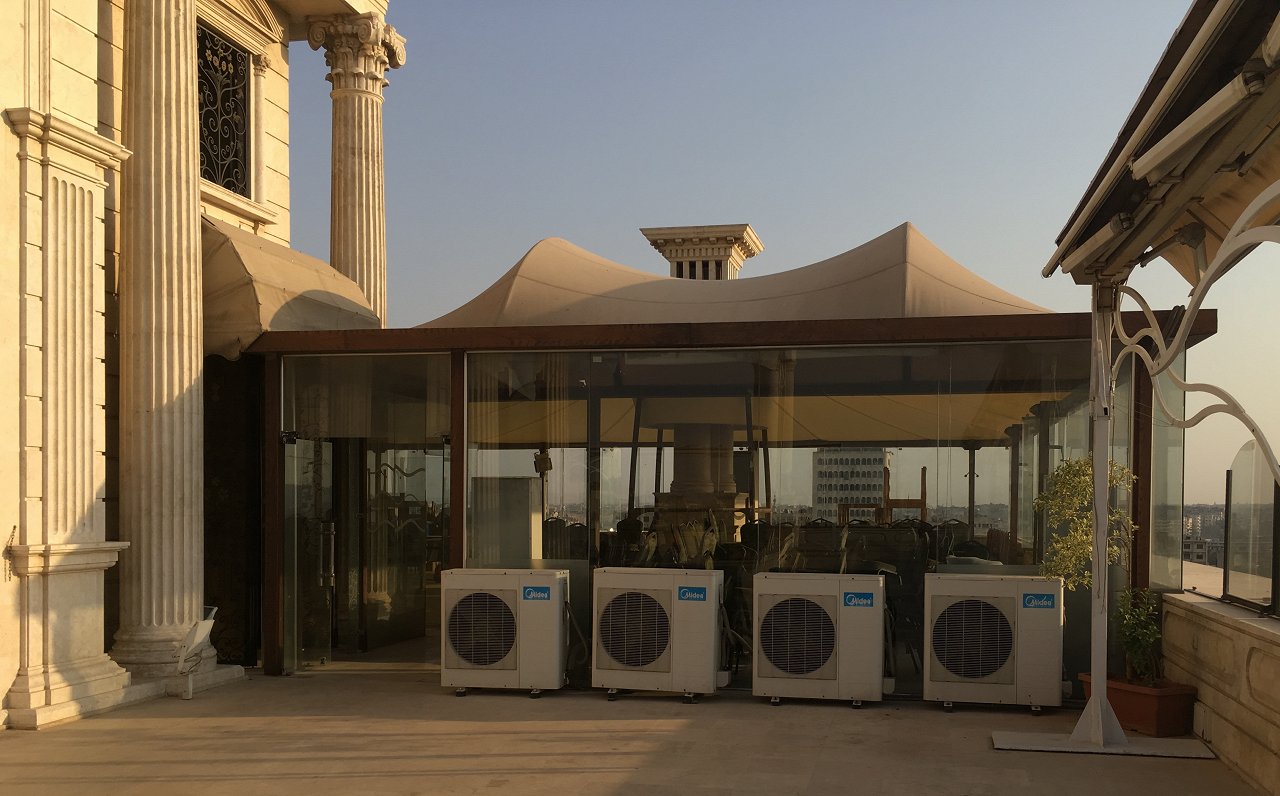
We've ordered fruit juice at one of the tables, and Nawras Riga lights a cigarette. He's home after a long day of work at the Aleppo hospital. The gray-haired man sitting opposite to me is a radiologist. He's had different patients today - an expecting woman, a few children. He likes talking about medicine, and our conversations will often stray into that topic.
This is a moment when I can look at Nawras peacefully as the worry and wonder of a first meeting are behind me. When I first saw him, at pitch-black evening on the hotel staircase after arriving from Damascus, dizzy from long-distance travel, I admit I even forgot to turn my radio recorder on to document the first meeting.
Now, with him sitting across the table, I recall how I came to know about Nawras Riga and his extraordinary story.
The beginning of the story
In winter, when I was busy writing a commentary piece on Syria and Aleppo, which was being bombed at the time, I came across this factoid: in Aleppo there's a hotel named Riga Palace. As the newest reviews had been left quite a while ago, I assumed it had been destroyed by bombs, as much of the city was.
But in summer I learned that it's not the case. It was in this hotel where the architect Bruno Deslandes stayed while he was assessing the state of the city's UNESCO heritage. He had met the owner, one Nawras Riga, and learned his fascinating story.
I contacted Mr. Riga on Facebook and he replied instantly. I realized that, while it would be nothing short of a miracle, I really wanted to meet him.
Now, several months later, after waiting for a Syrian visa, coming a long way through Turkey and Liban and spending six hours in a car en route to Aleppo from the capital Damascus, I am sitting across Nawras at the Riga Palace and listening to him.
I have many questions - first of all personal. How did he get a surname like that?
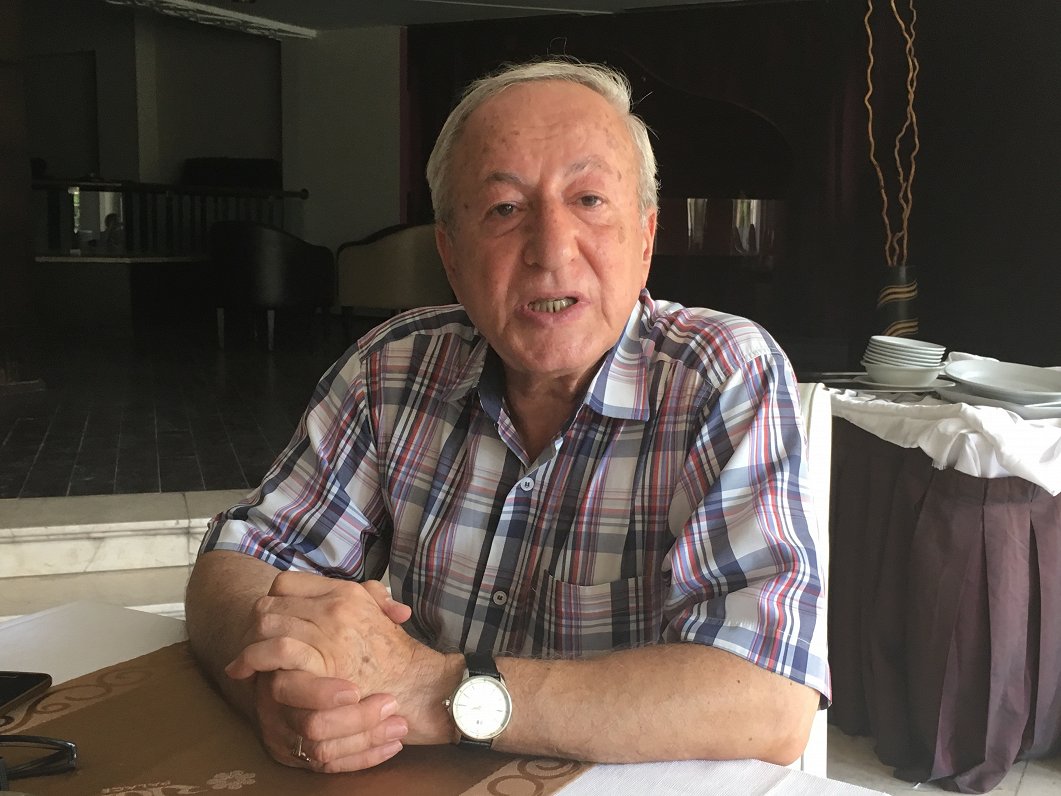
The unusual ring
Nawras Riga starts relating his tale by removing an unusual ring from his finger, putting it in front of me: "First look at the ring... You can find this kind of stone in Riga very often."
"Is this amber?" I ask him.
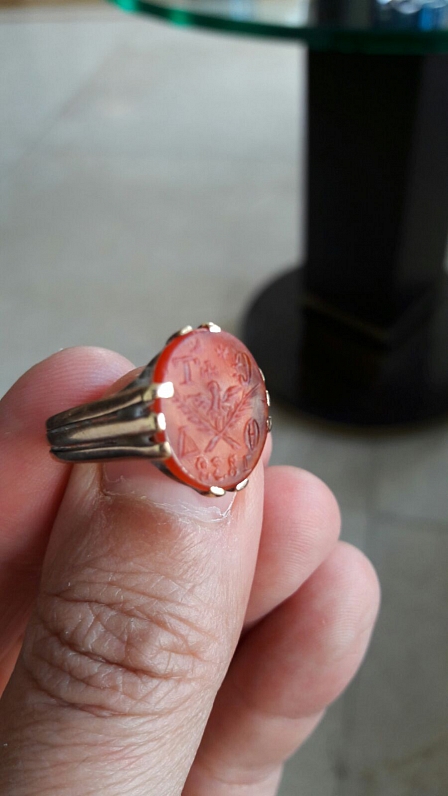
"Yes, and this is our emblem," he says. "You see, the year 1838. There's a pigeon and a cross, and then we have Delta and Omega.
I cannot give you the history of our family, but our origins are not from this region. We're from Riga.
But we don't know how and why we came. In 1838 my family left Riga. My great-great-grandfather left the region by sea, and they arrived to Lebanon, and stayed there for maybe 50 to 60 years, in the region called Bsharri.
But at that time Syria and Lebanon were under Ottoman occupation. There was practically no Lebanon back then. There was the Great Syria, composed of Lebanon as well as, Syria, Jordan, Cyprus, Iraq and Palestine. To separate Christians from Muslims, they gave Christians the current territory of Lebanon.
Back then my family was a Christian family living in Lebanon, and coming from Riga. Each territory under the Ottoman empire had a vali, a representative of the Great Sultan. The vali (governor) of Syria had remarked that the people in Lebanon were more educated, better developed than here. He asked the vali of Lebanon why they had it better in Syria. The other replied that they had very many Christian people. The vali of Syria then asked Lebanon for forty Christian families to settle in Aleppo. And my relatives were among these forty families."
That's why, he says, there's a street named Forty in Aleppo, which owes its name to the forty Christian families that had initially settled there.
"Later, of course, they all intermingled - the Christians, the Muslims, the Jews," Nawras said, and this still holds true about Aleppo, a culturally diverse town if there is one. He supposes that the surname Riga was allotted to his family once they had settled in Lebanon. "Here you can find a family name depending on their origin or their job. For example, we have a surname, Hajjar. It's a surname for people who were stoneworkers," he said.
He speculates his family might have obtained their current surname via a similar process.
A Russian girl
Were Nawra's ancestors ethnic Latvians or did they just come from here? "I don't know. Maybe. My father seems to me to be 100% European. My daughter - the same. I have mixed blood. My mother was Lebanese. But when you look at my daughter..." he says, and then stops to find a picture in his phone, a picture of a beautiful, fair-haired young woman in a wedding dress. He continues with a deep laugh, "she's a Russian girl!"
Nawra has three brothers, but as the eldest he has the duty to keep after the family heritage. "My father and my grandfather told me that the ring was taken from the time when they were forced to leave Latvia, afraid from the Czar or other repressions. They took this as a souvenir, and the eldest son always has to wear it. My father was the eldest, and I am the eldest son."
"I tried looking up my family history in the archives, but, you know, there's too much war, and all the records were mangled and incomplete, even the church records. My father said that when we left Latvia, we had been Orthodox Christians. When came to Lebanon we became Maronites. But in the beginning we were Orthodox, from the Russian church.
All we have in hand is our name. That's everything. The name, and the day when we left."
The hotel bearing Riga's name
And now his family name, and that of the Latvian capital, is carried by the Riga Palace. It's a luxurious high-rise in Aleppo in a neighborhood that had formerly been dirty, dark and dangerous. They bought the land, bought up the tiny stores surrounding it, and started building the hotel in 2000 to finish it eight years later.
That was a time when many tourists were visiting Syria, and the Riga Palace was always booked fully for months in advance. But then war broke out.
"It was in July 6, 2012 when I stopped everything. I kept the people working, I paid them salaries for all these years, but stopped receiving guests, for their own security. Just six months ago we wouldn't have been able to sit here like we are sitting now. There were snipers who could kill you. In 2010, I had 140 people working. During the war there were just 40 people. The rest simply disappeared. I don't know where," Nawras says.
He himself did not leave Aleppo for a long time. After taking his wife and daugther to Lebanon and his son to France, he returned to Aleppo from time to time and spent time here with his brother Amir.
"If I had left the hotel, I would either get ISIS or the army coming in to turn into a barracks.
I would have been the worse off in both cases, so I decided to stay," Nawras says.
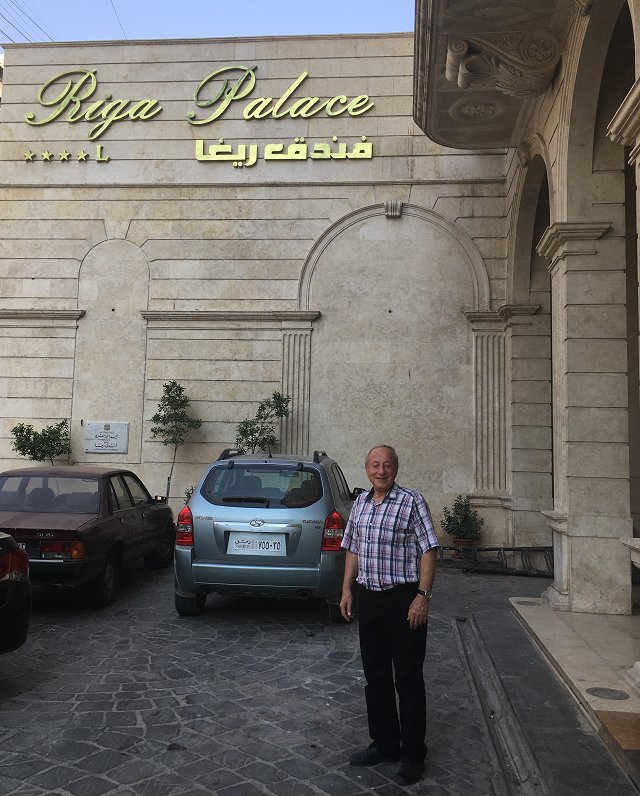
Shattered glass and collapsed ceilings
Aleppo was bombed heavily when fighting was at its height, and the hotel suffered too.
„Three big rockets fell around the hotel. All the windows were broken, and even the ceiling fell down from pressure. I repaired it the first time. People around me told me, 'Why are you repairing it? Wait until the fighting ceases.' But I could not bear to look at my hotel in this state. After a year there came more rockets. I repaired everything again. And then in the third year, practically six months ago, dozens of rockets and missiles fell around here, as there was intense fighting over freeing eastern Aleppo, and the army used whatever it had.
And I started rebuilding again. It has taken too much money and too much time.
But now I could say the hotel is ninety percent like it was before," Nawras sighs and looks across the terrace.
Nawras said he needs young and able employees at the hotel, but it's difficult to find them in Aleppo as many men have left Syria to avoid conscription, and the eligibility age in Syria is 42.
"War is war. Who would honestly want to die," he says, adding that it's no ordinary war in Syria, as it's domestic warfare against terrorists.
"We're not dealing with people here, but rather brainless beasts," he says.
"I believe things will get better next year," says Nawras. "I firmly believe so."
Riga plans
"You must see the Riga of Latvia," I tell Nawras, and he says he had planned to do so twenty years ago.
"My university professor, a friend, had been in Riga and told me they had a lot of amber and that Riga was like a little Paris," he says.
Then Nawras asks me about obtaining a visa, and he's glad that Latvia is in the Schengen free travel area as he has a residence permit in France where he has a home.
"Then I'll hop on a plane, go there and find out my real surname," he says.
And I'm keeping Nawras to his word - imagine him visiting Latvia during the centenary next year, seeing Riga, the Daugava River, the Song and Dance Festival, coming from Aleppo and seeing the land of his ancestors with his own eyes.
The rose
We're keeping in touch with Nawras, or, as I have come to call him, Mr. Riga. When I came back from Syria to my Brussels office of Latvian Radio, I messaged him on Facebook, saying I'm fine and thanking him for his hospitality.
And then, a few days ago, as I started writing this story and was looking for sound recordings, I saw a message flashing in my Facebook account. I opened it, and it was from Syria, from Mr. Riga - he had sent me a digital rose with the signature that it's for someone whose life paths had crossed his.
I know fore sure that his path will be a happy one, and that we'll be seeing one another in person in Latvia, in Riga.
